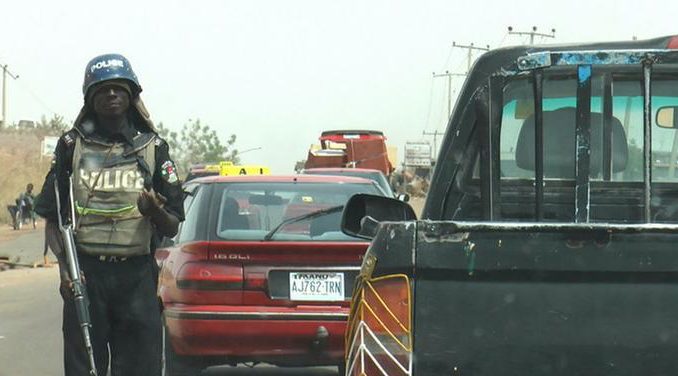
The recent appeal from the Senate to the Inspector-General of Police, Mohammed Adamu, to reduce the number of security checkpoints on the federal highways should be regarded by the authorities concerned as an assignment of urgent national importance. The call is in the public interest and should not be ignored by the IGP and other security agencies.
The prevalence of armed robbery, kidnapping, marauding killer-herder activities, cultists and ritualists, among other ramifications of insecurity could justify the presence of security operatives, though not the current barricades that put major roads on a lockdown as operatives make frivolous checks and financial demands on law-abiding citizens. It bears repeating that security is more of intelligence gathering than physical presence or lounging by uniformed men. But in the interim, the road users are advised to brace themselves for the worse, while hoping for safe and hitch-free travels.
Indeed, the sight of multiple checkpoints across major highways is enough to draw the ire of all, not only the lawmakers. Across all the nooks and crannies of the country, the heavy deployment of checkpoints is a grim reality that is typical of territories under siege. It is as if the menace of Boko Haram has now infected the South-West and the South-East even more than it is in the North-East.
Let’s be fair to the security agents, though. The turnpikes had increased in the wake of kidnappers and daredevil killer herdsmen reducing our major arteries to theatres of war. With air travel still poorly connecting the cities or simply nightmarish due to delays and cancellations by airline operators, terrorists are waylaying the highways for their targets.
No one should forget so soon the shameful killing of Mrs Funke Olakunri, daughter of the Afenifere leader, Pa Reuben Fasoranti, in an alleged kidnapping attempt by herdsmen on the Ondo-Ore Expressway. Just before that, a visiting family of three from Canada – father, mother and daughter – were abducted and the women raped by the kidnappers before their ransom arrived. Memories of these gory incidents, among many others, will forever haunt these families and forever too will they loathe the Nigerian system that let them down at the most critical time of their lives.
To deliver us from this evil, the Federal Government announced the deployment of troops on the highways. It means travelling was never going to be convenient; it never was. On the flipside, the speed bumps of “stop and search” teams were the price to pay for safe travels and security. Snaking at a snail’s pace on the highways is by a far lesser evil than scampering to dodge AK-47 bullets that are randomly shot by maniacs that often are called kidnappers and herdsmen. After all, we are all better late than never. For these efforts at keeping us safer even at the expense of their own lives, we thank the security agents.
However, the ugly and regrettable side of the development is the multiplicity of the barricades and extortions that go with it. Today, across all the federal highways in the Southern part of the country are checkpoints by diverse security agencies – the Army, police, customs, Federal Road Safety Corps, National Drug Law Enforcement Agency, National Security and Civil Defence Corps and Immigration. Worse still, the agencies are resorting to self-duplications such that it is possible to, from one checkpoint, sight another between 200 metres and one kilometre ahead. Between Omotosho and Ore, in Ondo State, a distance of 39 kilometres, for instance, there are about 20 checkpoints. A traveller once counted a total of 400 checkpoints between Lagos and Onitsha, with travel time now more than double for road users. Most reprehensible is that most of the stop-and-search units are often to squeeze the commuters. After the verification of essential car documents, accessories and baggage, the next is to demand freebees – by hook or by crook. Such actions negate the good intention of keeping the highways safe and this act stands condemnable at this time.
It is in this sense that the IGP and other heads of security agencies cannot leave the proliferation of checkpoints unchecked. In their ranks are many officers who are bent on giving the agencies and Nigeria as a whole, a bad name. Specifically, Adamu should note that an empty declaration against police extortion will be futile. His earlier proclamations had gone unheeded by his men. It is also no longer acceptable that the customs would be so complacent as to allow unregistered vehicles to bypass the border posts with the hope of apprehending them in the highways’ stop-and-search. As the Senate has called, all the concerned parties must do everything possible to keep the checkpoints minimal, as their men deploy more intelligence in combating the threats to life and property.
Officials on checkpoint duties too must be reminded that they must watch and lower their expectations from the travelling public, who are already stressed by the decrepit state of the roads. Mounting roadblocks for the sake of extortion is never charitable nor likely to earn anyone any goodwill. More so, the main security threats operate by no rules whatsoever and often avoid your checkpoints. It is the law-abiding citizens who approach the checkpoints in an orderly manner. So, reduce the checkpoints and keep the traffic flowing.
Shittu Boluwatife Sarah, Ijebu Ode, Ogun State
END

Be the first to comment